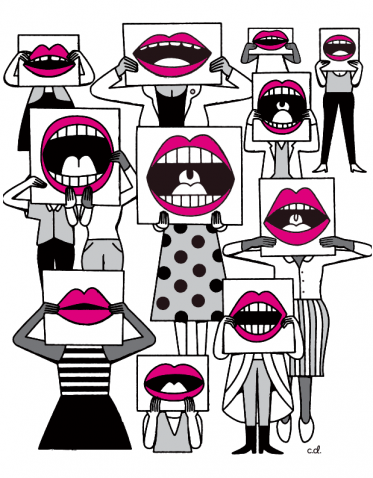The quickest way into a job in public radio is to intern. And so there I was, at 40, screening calls for a local political affairs show—and I started to notice something interesting. When the guest was female, or when a woman filled in for the male host, callers would ring not just to criticize her ideas, but also her voice.
They would say things like, “This guest sounds like a child,” or, “She’s so shrill I can’t understand anything she’s saying,” or, “Your producers should know I had to turn the radio off, she was so annoying.”
During the three months I was screening calls, I never heard a listener complain once about a man’s voice.
This is not a new problem.
I asked my college roommate—Amy Mayer ’94, who is a reporter at Iowa Public Radio—about her experience. “When I was applying for jobs after finishing my master’s in journalism, I was 26 years old. I prepared a tape, which is what you had to do at the time—a physical cassette tape—that had stories I had done,” she says.

“I clearly had the experience to be an entry-level reporter, and again and again and again I was told that I sounded too young. And I felt so frustrated, because youth is not a characteristic that you can alter or develop or change or work on.”
She points out that young men are not told they sound like children, though of course men go through a vocal change in puberty that women don’t. Yet young men do, in fact, usually sound like young men. Their voices are often unseasoned and less resonant. But neither Amy nor I can think of a male reporter who had been told he sounded too young. This is only something that happens to women.
An Authoritative Voice
Women in radio aren’t the only ones who are told they sound “too young” to do their jobs.
Julie Flowers ’01, a minister at the First Baptist Church in Beverly, Mass., tells me about one of the first times she gave a sermon as a ministry student. She was working with her current congregation, and a prominent retired minister had come to hear her.
“I felt nervous, but also excited—I get to preach in front of this person who everyone talks about, this larger-than-life person,” she says. “So he came up to me after and said, ‘Well, that sermon seemed somewhat credible, but my main complaint is that your voice is too high, and if you can’t moderate your voice so that people can hear it, you’re not going to be an effective preacher.’”
‘I felt upset thinking, “Is it true that the words I say are going to matter less than the timbre of my voice?” Tell me I talk too fast— that’s true and something I can work on. But my voice is my voice.’
—Julie Flowers ’01, Baptist minister
Her immediate thought was: He must be joking. He wasn’t.
“I felt like the wind was knocked out of my sails,” she says. “I felt like it had been a good sermon. I felt proud of what I had done. And I felt upset thinking, ‘Is it true that the words I say are going to matter less than the timbre of my voice?’ Tell me I talk too fast—that’s true and something I can work on. But my voice is my voice.”
When women are told they sound too young, or that their voices are too high, what this means is that to the listener, they do not sound as though they have enough authority to be delivering the word of God, or a political position, or the headlines. Linda Cozby Wertheimer ’65, one of the doyennes of NPR, tells the story of how as a new graduate she interviewed for a job at NBC. She was told that “women are not credible delivering the news.” She wasn’t hired.

The Science of Speech
These stories don’t surprise Andrea Levitt ’71, Margaret Clapp ’30 Distinguished Alumna Professor of French and Linguistics at Wellesley. She often teaches about how we assess people on the basis of their voices, and her current research with Margery Lucas, a Wellesley professor of psychology and cognitive and linguistic sciences, looks in part at how men and women view women’s dominance, youth, and attractiveness based on short segments of speech.
“We certainly found that the lower your pitch—for both men and women—the more dominant you are generally considered,” she says. In our American culture, to have authority, women need to lower their voices.
“But most of what’s going on is a form of policing of women that’s sexist,” Levitt says flatly.
Women’s bodies tend to be smaller than men’s, which means they have smaller voice boxes and thus higher voices. Studies have shown that when women are in the fertile part of their menstrual cycle, their voices are higher; after menopause, women’s voices drop slightly. (Men’s tend to rise in pitch when they are elderly.)
Levitt says that evolutionary psychologists tend to think that certain vocal traits let you determine how big a person is—whether the person you’re talking to is a man, woman, or child. They believe these traits are immutable and help women and men to make judgments about who would be a successful mate. People exploit that by talking at the higher end of their range if they are women or the lower end of their range if they’re men—to reinforce their own gender roles.
For women, attractiveness and authority are often at odds. Higher, breathy voices (think Marilyn Monroe) are seen as sexy in women. Lower voices are not.
‘We certainly found that the lower your pitch—for both men and women—the more dominant you are generally considered.’
—Andrea Levitt ’71, Margaret Clapp ’30 Distinguished Alumna Professor of French and Linguistics
“There’s also the sexy, authoritative woman, but her sexiness is also perceived as castrating. You know what I mean, like Sigourney Weaver in Working Girl,” says Pamela Robertson Wojcik ’86, a film professor at the University of Notre Dame. “In the 1930s, Joan Crawford was just kind of sexy, but as she got older, she was sexy and castrating. And I think now we really have this association.”
In contemporary life, Wojcik says, “there seems to be a sense that being successful is somehow twisting the woman away from appropriate femininity.”
Vocal Fry
This might explain the very recent focus on vocal fry in young women. Vocal fry is a low creaking often heard at the end of sentences, and the media looks on it with horror. Matt Lauer, the host of NBC’s Today Show, for example, said it was something “that is creeping into the speech patterns of young women” in 2011 after a study published in the science journal PLOS ONE said that vocal fry might keep women from getting a job. (Note that no similar study seems to have been done on young men.)
Men do have vocal fry, however; almost everyone does. In a recent episode of the popular radio series This American Life, host Ira Glass said in a segment about women’s voices that he has vocal fry, but no listeners have complained about it. On the other hand, he notes listeners regularly complain about it in the voices of women producers.
Yet Levitt, the Wellesley linguist, says that creakiness is rated more highly for dominance than other characteristics, like breathiness. “Women are criticized for doing it. But at least some women, and the women in our study, found it reflects dominance. And one of the hypotheses is that women do it to demonstrate some sort of authority,” she says.
Vocal fry, which pushes the voice at the lower end of the register, is almost the opposite of uptalk, which is when people end sentences with an upward pitch, like a question, as if they were asking, “Are you following me?” Men also do uptalk, but they are rarely criticized for it.
In other words, no matter what women do, we can’t get it right. Talk too high and we sound shrill or “like children;” sit on our voices to lower them, and we’re accused of sounding hectoring, or lecturing, or adopting the “affectation” of vocal fry. Or sometimes we’re told that the listener “just can’t understand women’s voices.”
“The problem is that people often don’t want to make that little bit of effort,” Levitt says. “And so, if older men are thinking young women don’t have much to say, if there’s anything about their speech that might be difficult for them to process, they just won’t do it.”

May I Help You?
There is, however, an area where women’s voices are preferred: digital personal assistants. Apple’s Siri, Amazon’s Alexa, the voices of cars and GPS devices—these are almost always female voices. An article on CNN’s website says that’s because women’s voices are seen as warmer and—surprise!—are more easily understood.
The article also posits that people are just used to women being helpful and providing them information—like telephone operators. Or secretaries.
Ironically, a Time magazine article says that these same digital assistants have a harder time deciphering women’s voices, because they are designed to recognize the louder, lower voices of men.
I called Zehra Fazal ’05, a voice actress in Los Angeles. Her natural voice is low and friendly and melodic—a babbling brook of a voice. But she’s an actress, so she can also talk like a child, or an excited teenager, or a robot.
She’s been the voice of animated characters and of popular products. Fazal has also done work for the military’s GPS system. “Military GPS voice tends to be women. The majority of soldiers using the system are male, and so hearing a reassuring female voice is something they’ll react to naturally better, is the research,” she says.
Marketing products is about conveying information, too, Fazal says, and so ad agencies rely on tested voices that make people feel most comfortable. Women narrate commercials about beauty products, as well as insurance; men voice commercials about cars and the trailers for films.
But keeping people within their comfort zones only reinforces those hard boundaries—men’s voices are for some things, like presenting the news, and women’s voices are for other things, like giving help.
“I think change needs to happen. But it’s a reflection of our society, right? People just listen more to men.” Fazal thinks a moment. “If I’m out with a group of guys and I say something funny—it just gets not heard. But if a man repeats what I just said, everyone laughs. I think people are just not physically wired in to give weight to women’s voices.”
She’s not the only one who thinks so. Tucker Rosebrock ’10 transitioned to living as a man after Wellesley. He says he’s seen a marked difference between how he was treated when he was presenting as a woman and how he’s treated now.
“I find my voice carries a lot more. It’s easier to talk over someone unintentionally,” he says.
But there’s something else. He says that women tend to talk with other women, giving verbal feedback that’s meant to just acknowledge participation in the conversation.
“I’ll be in a casual conversation with women where I’m just sort of agreeing—and they’ll stop short and listen,” he says. “And I’ll say, ‘No! No! I’m not really saying anything, you don’t actually have to listen to what I’m saying.’ It seems like I’m interrupting, which is not what I meant to do. It’s very strange to notice the difference: When I start talking, people will just listen to what I say, without me having to make a concerted effort.”
Carrying Women’s Voices Further
There are two ways to approach the “problem” of women’s voices. One is to change yourself by moderating your own voice. That’s what executive voice coach Ann Timmons ’79 urges women to do. “A lot of girls are socialized to not inhabit their presence and bring their authority to it. They’re taught at a young age to sit down and shut up,” she says.
It’s not as easy as just lowering your voice. That leads to vocal fry. Instead, Timmons says, “You have to learn to play your instrument. Sit up straight, take a deep breath. We do vocal exercises and figure out where your voice is resonating. Some women really do need to think about what their sound is saying about them.”
Her point is that people have a voice they use with friends and family and then a professional voice—and that professional voice should be as polished as the clothes they wear to work.
‘A lot of girls are socialized to not inhabit their presence and bring their authority to it. They’re taught at a young age to sit down and shut up.’
—Ann Timmons ’79, voice coach
Wellesley associate professor Jenny Olivia Johnson, in the music department, says she developed a professional voice after reading Carl Sagan’s Contact in college. In it, a female graduate student had to develop what she called her “physics voice” in order to navigate her all-male environment.
“That stayed with me my whole career,” Johnson says. “I was already gearing up to create a career in music composition, which in the ’90s was heavily male-dominated. I had that feeling of, if I’m going to play with the boys, I have to play like the boys.”
She says she worked hard to eliminate uptalk, to talk more slowly, and to generally sound more authoritative. “I don’t like that I had to do that, but now it’s automatic,” she says. “I wouldn’t call my style masculine, exactly, but in a way it’s derived from expectations of authority that are sometimes coded masculine.” It reads as confidence, she says, and competence and intelligence. “There’s a reason we need to develop this sort of voice in order to be taken seriously,” she says, especially in male-dominated fields.
The second way to help people hear authority in female voices is to change society, by providing more opportunities for people to hear smart voices that are higher, lighter, and younger.
“I’ve thought about this,” says Mayer, my former roommate and a radio reporter. “I’ve heard women’s voices where I think, ‘They’re too young, they can’t be on the air.’ But then I think, ‘Why can’t they be on the air?’ Maybe by them being on the air, they’ll expand people’s palates for what reporting sounds like.”
Public radio reporters may get so much pushback on their voices because there are so many women of different ages on the air and in podcasts. This has been true of NPR since its very early days in the mid-1970s.
Linda Wertheimer was just one of the many women hired in NPR’s first years—Cokie Boggs Roberts ’64 was, too, along with Susan Stamberg and Nina Totenberg. Most of those early female heavy-hitters were married.
“That way, they didn’t have to live entirely on the NPR salary,” Wertheimer says. “NPR didn’t pay very well, so that’s one of the reasons there were a lot of women. Maybe they thought they had to make a virtue out of necessity. But it does mean that NPR always had more women than anybody else [in journalism]. That doesn’t speak well for our industry, but it does speak well for NPR.”
I’ve often been told that I sound young on the phone, because I have a lighter voice—people guess that I’m in my 20s, not my 40s—but I haven’t (yet) been sent a listener complaint for my radio work. Then again, I’m only on the air once or twice a week, and when I am, I talk about theater and culture, which are generally more “acceptable” topics of female conversation than economics or politics or sports.
But I do edit the work of many female reporters, and thinking deeply about how people react to women’s voices has changed the way I respond to their voicing of stories.
Editors sometimes automatically tell women, “talk lower,” when something is not working with how reporters are telling a story.
But it’s not about talking lower—not for reporters, not for any of us who speak on a public stage. It’s about relaxing, taking a deep breath, and talking in your regular voice—because, as voice actor Fazal says, your regular voice can convey a range of emotion and passion that artificial deep talking cannot. You want to sound like yourself.
And it’s also about being a good listener. Women are often the most critical of other women’s voices—but instead of focusing on how they sound, on being quick to judge them on their youth or uptalk or vocal fry, let’s listen to what other women have to say. Because criticizing a woman’s vocal pitch instead of her ideas is the same as criticizing her body instead of her thoughts. Let’s treat women’s voices the same as we treat men’s—with respect.
Jennifer Vanasco ’94, a former award-winning columnist, is an editor in the WNYC public radio newsroom and the on-air theater critic. She lives in Manhattan with her son.











We ask that those who engage in Wellesley magazine's online community act with honesty, integrity, and respect. (Remember the honor code, alums?) We reserve the right to remove comments by impersonators or comments that are not civil and relevant to the subject at hand. By posting here, you are permitting Wellesley magazine to edit and republish your comment in all media. Please remember that all posts are public.